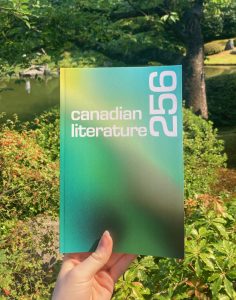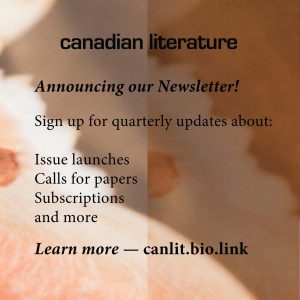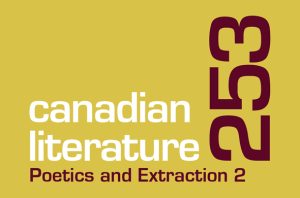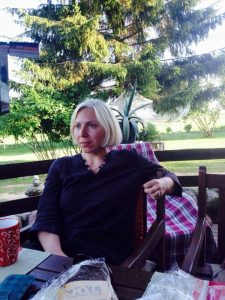— SUBMISSIONS CLOSED —
EXTENDED Deadline: January 19, 2024 (PT)
In the landmark 1997 Delgamuukw land claim brought before the Supreme Court of Canada (Delgamuukw v. British Columbia), the Court ruled that traditional Indigenous story was admissible in court as evidence of land ownership, legitimizing a kind of literary land claim. This special issue of Canadian Literature examines the way literary texts claim space and explore questions of belonging for Indigenous, diaspora, and settler populations.
The issue will consider narratives from communities in Canada that assert or contest relations between land, story, ownership and belonging—whether it be in rural or urban environments, and in forms as varied as traditional Indigenous stories or hip hop’s practice of paying tribute to home through “reppin’.” Processes of claiming or challenging narratives of belonging are clearly different for Indigenous, diaspora and settler populations, since one consists of original inhabitants; another of immigrants with ties to elsewhere; and a third of settler populations who examine an uneasy colonial relationship to the land, which ultimately contributes to either a sense of national belonging or alienation. Okanagan scholar, author, and activist Jeannette Armstrong writes, “I am claimed and owned by this land, this Okanagan” (174), and her poetry and prose embody that relationship. In Literary Land Claims (2015), settler scholar Margery Fee traces how texts use strategies to claim – or problematize the act of claiming – land, story, and belonging. How do other populations describe their belonging in territories claimed by Canada?
Black scholar Rinaldo Walcott, in his essay “Towards a Poetics of Black Space(s) in Canada,” signals the importance of such an undertaking: “It seems that one of the challenges facing contemporary Black Canadian art is to move beyond the discourse of nostalgia for an elsewhere and toward addressing the politics of its present location” (46-7). By centring the politics of the present, this issue seeks to demonstrate the ways writers address the politics of place through literary land claims. Connecting community to place in the multiple national imaginaries both engenders and demonstrates belonging, helping us redress systemic racism and assert the right to safe spaces. We will consider the politics of claiming stolen land, and the ways that class, race, cultural practice, gender, sexuality, and disability intersect into questions of territorial belonging, nationhood, and connection to place.
All papers examining space and place in relation to belonging in Canada are welcome, in particular those examining questions of race, cultural practice, gender, sexuality and disability. Papers dealing with “third space” or “liminal space” are also encouraged.
We particularly encourage submissions from emerging scholars. In an effort to include a wide range of perspectives and approaches, this issue will include shorter-form submissions combined with longer forms, and an opportunity for emerging scholars to engage in a mentorship process in implementing editorial comments after the double-anonymized peer-review process.
EDIT: A previous version of the poster for this call includes a typo for the word “Indigenous.” Please note that the link to learn more still works, but the title of the issue will feature the corrected spelling rather than the misspelling in the previous poster.
Submission Guidelines
All submissions to Canadian Literature must be original, unpublished work. Essays should follow current MLA bibliographic format (MLA Handbook, 9th ed.). Word length for articles is 4,000-8,000 words, which includes endnotes and works cited.
Please feel free to contact the journal editor, Christine Kim, at cl.editor@ubc.ca, or the special issue guest editors, Heather Macfarlane (hcm1@queensu.ca), Sophie McCall (smccall@sfu.ca) or Basmah Rahman (13bsr@queensu.ca) to discuss ideas ahead of time. Submissions should be uploaded to OJS by the deadline of January 1, 2024. Our Submission Guidelines can be found at canlit.ca/submissions. General questions about the special issue may be directed to can.lit@ubc.ca.
Please limit images accompanying the submission to those receiving substantial attention in the article. Note that contributors are responsible for obtaining permission to reproduce images in their article, and must pay any permission costs. The journal can provide a sample template for permission requests. Permissions must be cleared before publication. Please send low resolution images (small jpegs), in separate attachments. If the article is accepted, high quality images will be required.
Works Cited
Armstrong, Jeannette. “Land Speaking.” Speaking for the Generations: Native Writers on Writing, edited by Simon Ortiz, U of Arizona P, 1998, pp. 174-95.
Fee, Margery. Literary Land Claims: the “Indian Land Question” from Pontiac’s War to Attawapiskat. Wilfrid Laurier UP, 2015.
Lamer, Chief Justice. “Delgamuukw vs. British Columbia.” Canadian Native Law Reporter, vol. 1, 1998, pp. 14-97.
Walcott, Rinaldo. “‘A Tough Geography:’ Towards a Poetics of Black Space(s) in Canada.” Black Like Who? Writing Black Canada. 2nd revised ed., Insomniac Press, 2003, pp. 43-56.
Links
Read more about Canadian Literature‘s Submission Guidelines
Submit your work through Open Journal Systems (OJS)

 What is Canadian literature? The question of how we might define Canadian literature has often been debated through discussions about, for example, canons, institutions, and most recently settler colonialism. But as I return us to this question, I want to pose it differently by approaching the field of Canadian literature as problems of methodology and object. In doing so, I hope to reflect upon how we understand Canadian literature as a category or Canadian literary studies as a field, and, moreover, what work we see them as performing. In reflecting upon how our methods and objects define the field of Canadian literary studies, my intention is to ask questions about how we approach it, the kinds of analytics we employ, and the questions we chase. And as critics working within the field, what do we read? Or to put it another way, what have we conventionally gravitated towards as a proper object for Canadian literary studies? In presuming that others lie beyond the bound of the field, what moves are being made about how we map geographies and write histories? How does that speak to the histories of Canada and which relations it has been willing to acknowledge?
What is Canadian literature? The question of how we might define Canadian literature has often been debated through discussions about, for example, canons, institutions, and most recently settler colonialism. But as I return us to this question, I want to pose it differently by approaching the field of Canadian literature as problems of methodology and object. In doing so, I hope to reflect upon how we understand Canadian literature as a category or Canadian literary studies as a field, and, moreover, what work we see them as performing. In reflecting upon how our methods and objects define the field of Canadian literary studies, my intention is to ask questions about how we approach it, the kinds of analytics we employ, and the questions we chase. And as critics working within the field, what do we read? Or to put it another way, what have we conventionally gravitated towards as a proper object for Canadian literary studies? In presuming that others lie beyond the bound of the field, what moves are being made about how we map geographies and write histories? How does that speak to the histories of Canada and which relations it has been willing to acknowledge?



 Adam Dickinson is the author of four books of poetry. His latest book, Anatomic (with Coach House Books), involves the results of chemical and microbial testing on his body. His work has been nominated for awards including the Governor General’s Award for Poetry. He teaches at Brock University.
Adam Dickinson is the author of four books of poetry. His latest book, Anatomic (with Coach House Books), involves the results of chemical and microbial testing on his body. His work has been nominated for awards including the Governor General’s Award for Poetry. He teaches at Brock University. Rūta Šlapkauskaitė is an Associate Professor of English literature at Vilnius University, Lithuania. Her research interests include Canadian and Australian literature, neo-Victorianism, and environmental humanities. Among her recent publications are “An Ecology of the Hewn in Susan Vreeland’s The Forest Lover” in the collective monograph The Northern Forests co-published by the University of Tartu and Montreal’s Imaginaire Nord; “The He(A)rt of the Witness: Remembering Australian Prisoners of War in Richard Flanagan’s The Narrow Road to the Deep North” in Anglica: An International Journal of English Studies; and “Precariousness, kinship and care: Becoming human in Clare Cameron’s The Last Neanderthal” in The Journal of Commonwealth Literature.
Rūta Šlapkauskaitė is an Associate Professor of English literature at Vilnius University, Lithuania. Her research interests include Canadian and Australian literature, neo-Victorianism, and environmental humanities. Among her recent publications are “An Ecology of the Hewn in Susan Vreeland’s The Forest Lover” in the collective monograph The Northern Forests co-published by the University of Tartu and Montreal’s Imaginaire Nord; “The He(A)rt of the Witness: Remembering Australian Prisoners of War in Richard Flanagan’s The Narrow Road to the Deep North” in Anglica: An International Journal of English Studies; and “Precariousness, kinship and care: Becoming human in Clare Cameron’s The Last Neanderthal” in The Journal of Commonwealth Literature.